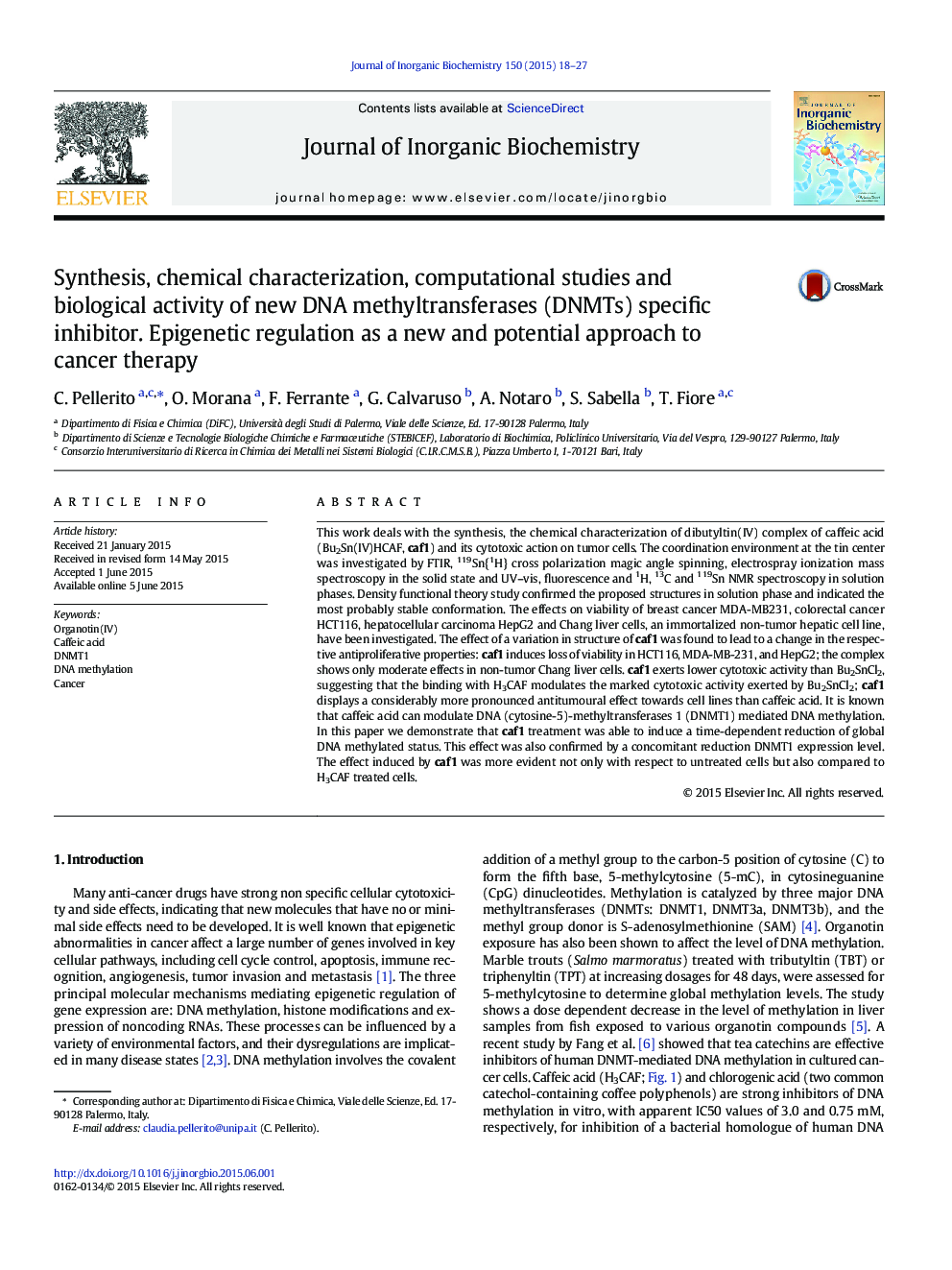| کد مقاله | کد نشریه | سال انتشار | مقاله انگلیسی | نسخه تمام متن |
|---|---|---|---|---|
| 1315850 | 1499437 | 2015 | 10 صفحه PDF | دانلود رایگان |

• We synthesized a new organotin(IV)–caffeic acid complex that is active towards tumoral cells.
• We evaluate dose response profiles of both caffeic acid and butyltin(IV) complex.
• We show a selective activity in HCT116, MDA-MB-231, and HepG2 cells.
• Bu2Sn(IV)HCAF acts as a DNA methyltransferase (DNMT) specific inhibitor at 10− 6 M.
• Bu2Sn(IV)HCAF is more active than caffeic acid towards DNA methyltransferases.
This work deals with the synthesis, the chemical characterization of dibutyltin(IV) complex of caffeic acid (Bu2Sn(IV)HCAF, caf1) and its cytotoxic action on tumor cells. The coordination environment at the tin center was investigated by FTIR, 119Sn{1H} cross polarization magic angle spinning, electrospray ionization mass spectroscopy in the solid state and UV–vis, fluorescence and 1H, 13C and 119Sn NMR spectroscopy in solution phases. Density functional theory study confirmed the proposed structures in solution phase and indicated the most probably stable conformation. The effects on viability of breast cancer MDA-MB231, colorectal cancer HCT116, hepatocellular carcinoma HepG2 and Chang liver cells, an immortalized non-tumor hepatic cell line, have been investigated. The effect of a variation in structure of caf1 was found to lead to a change in the respective antiproliferative properties: caf1 induces loss of viability in HCT116, MDA-MB-231, and HepG2; the complex shows only moderate effects in non-tumor Chang liver cells. caf1 exerts lower cytotoxic activity than Bu2SnCl2, suggesting that the binding with H3CAF modulates the marked cytotoxic activity exerted by Bu2SnCl2; caf1 displays a considerably more pronounced antitumoural effect towards cell lines than caffeic acid. It is known that caffeic acid can modulate DNA (cytosine-5)-methyltransferases 1 (DNMT1) mediated DNA methylation. In this paper we demonstrate that caf1 treatment was able to induce a time-dependent reduction of global DNA methylated status. This effect was also confirmed by a concomitant reduction DNMT1 expression level. The effect induced by caf1 was more evident not only with respect to untreated cells but also compared to H3CAF treated cells.
This work deals with the synthesis, the chemical characterization of Bu2Sn(IV)HCAF, caf1 [HCAF = bis-deprotonated caffeic acid] and the individuation of possible specific cytotoxic action on breast-cancer, colorectal-cancer, hepatocellular carcinoma and Chang liver cells. Results indicate that caf1 induce a time-dependent reduction of global DNA methylated status on cancer cells.Figure optionsDownload as PowerPoint slide
Journal: Journal of Inorganic Biochemistry - Volume 150, September 2015, Pages 18–27